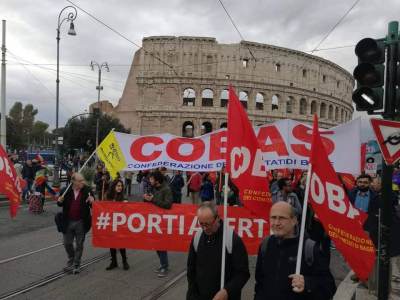The Story of Abdel Latif, from crossing the sea to dying in Rome, fixed to a hospital bed
Article first published on December 7, 2021
Open.online – The 26-year-old died in the hospital San Camillo in Rome after arriving in Sicily, first being detained on a quarantine ship and then brought to the detention and repatriation center (CPR*) in Ponte Galeria. There, his arms and legs were for days fixed to a bed.
Truth and justice for Wissem Ben Abdel Latif: This demand is beginning to be heard in Tunisia and Italy. He was 26 years old and being detained in a repatriation center in Rome. After he was referred to a hospital due to a supposed psychological illness, he was found dead on November 28 on a special hospital bed to which his arms and legs had been bound for days. It is still not clear whether he was bound when he died, since this is not reported in his medical file.
After the case was made public by the Tunisian congressman Majdi Karbai, it was picked up by the international campaign LasciateCIEntrare. The national guarantor for the rights of people detained or otherwise deprived of their liberty, Mauro Palma, has also spread the word. This has followed the mobilization of the regional officer Stefano Anastasia and Alessandro Capriccioli, regional councilor for the party Radicali/+Europa. Most recently, there were demonstrations in front of the Italian Embassy in Tunis, while the public prosecutor’s office in Rome has opened an investigation.
Journey by boat in October
Latif arrived in Augusta, Sicily, during October and was subsequently brought to a quarantine ship. There, “as elsewhere in Italy, it has become common practice that people from Tunisia do not get the chance to apply for international protection but are instead directly brought to the Repatriation Center of Ponte Galeria,” explains the campaign LasciateCIEntrare. They also published a video on their facebook-page, reported to be from the 26-year-old, in which he describes accommodation on the quarantine ship of the ferry company GNV.
From the quarantine ship Abdel Latif was brought to the CPR* Ponte Galeria, close to Rome. Here again he effectively had no chance to apply for asylum. Activists have been pointing this out for some time, i.e., the administrative detention of Tunisians. Following his detention in Ponte Galeria, on November 28 the ill-feeling Latif was for the first time brought into hospital, namely the Grassi Hospital in Ostia, and from thereon into the psychiatric ward of the San Camillo Hospital in Rome, where he died in the end.
“From the medical file that we could read it becomes clear that the young Tunisian had psychological problems. The Local Health Authority (ASL*) had requested a thorough psychiatric evaluation of his health status, due to which he was brought to the emergency ward of the Grassi hospital on November 23,” writes Alessandro Capriccioli in a statement published after visiting the Repatriation Center Ponte Galeria together with the regional guarantor for people’s rights deprived of their personal liberty. “From here, after two days the young man was referred to the psychiatric diagnostic and nursing service of the San Camillo Hospital and there exposed to sedative measures. This happened every day up until the 27, even though it is not clear how long these measures took. Finally, he passed away on November 28 due to cardiovascular arrest.”
Guarantor Mauro Palma has also requested and received Latif’s medical file. “It must be cleared up whether he was fixed at the time of his death, because this is not in the file. The blood tests were in order, it didn’t look as if he had health problems,” he told the Italian daily Repubblica. Meanwhile, Tunisian congressman Majdi Karbai has been calling the Repatriation Centers “the immigrant’s Guantánamo.”
On facebook, activist Feberica Borlizzi reports that Karbai was told by Latif’s family that “he did not have health problems.” If it were the case, however, emphasizes the jurist, “Abdel should under no circumstances have been detained, and therefore never set foot in the Repatriation Center Ponte Galeria. In any case it begs the question why five days passed before his death in the psychiatric ward was reported, where he was sedated and fixed to a bed for days?”
CPRs*, the ‘black holes’
According to Borlizzi, seven people have died in administrative detention during the last two years. The jurist has, together with the lawyer Gennaro Santoro, edited a report with the title ‘Buchi neri. La detenzione senza reato nei Cpr’ (‘Black Holes. Detention without Crime in Repatriation Centers’) that has been published by the Coalizione italiana per le Libertà e I diritti civili (Italian coalition for Liberty and Civil Rights), a network of 43 civil societal organizations. “We know that in the CPRs*, health care is managed by private firms, i.e., the operators. There is a shortage of nurses and doctors, the quality of treatment is unworthy of the name. We also know that in most CPRs* detainees are pumped full of psychotropic drugs, often without adequate medical prescription. We know that in most CPRs* the conditions are on the verge of inhuman treatment, with cells without alarm buttons and without adequate rooms for medical supervision,” criticizes the activist.
“We know that currently Tunisian citizens are becoming targets of actual raids. They are brought from quarantine ships to Repatriation Centers, to be repatriated within a couple of days. We know all this and much more. This umpteenth death cannot leave us indifferent. The responsibilities of the center’s doctors and medical staff must be investigated. But first and foremost, the Repatriation Centers, these hellish places, must be closed.”
Angela Gennaro
CPR – Centri di Permanenza per il Rimpatrio: Detention and Repatriation Center
ASL – Azienda Sanitaria Locale: Local Health Authority
Translated from German by Christian Lamp




